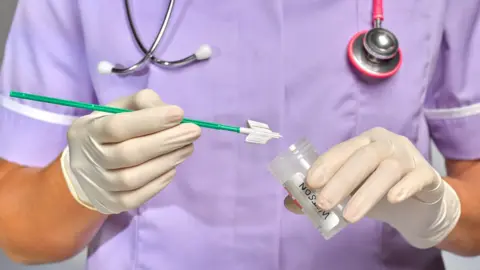Northern Ireland's bowel and cervical screening lags behind UK
 Getty Images
Getty ImagesNorthern Ireland's bowel and cervical screening programmes continue to lag behind the rest of the UK.
In other regions, bowel screening is offered to much younger people and a more sensitive smear test is used.
In a statement to BBC News NI, the Public Health Agency said any "decision to extend the age range is a policy decision that would need to be taken by the Department of Health".
It added that the move would also require additional funding.
With no executive or health minister in post in Northern Ireland, both moves could be difficult in the current political climate.
In Northern Ireland, bowel screening is offered to people aged between 60 and 74.
Elsewhere, it is offered to those who are younger. For instance, in Scotland the screening programme starts at 50.
In England, Scotland and Wales cervical screening or smear tests uses HPV primary screening. This is regarded as more sensitive as it tests the sample of cells taken at a woman's appointment.
It tests for a virus called high-risk human papillomavirus (HPV) that can cause cervical cell changes to develop into cervical cancer.
When it comes to cervical screening or smear tests, in England Scotland and Wales cervical screening actually tests for the HPV virus that can cause cervical cell changes to develop into cervical cancer.
In Northern Ireland, a less sensitive test called cytology continues to be used which examines the cells under a microscope.
'Funding decisions'
The UK National Screening Committee recommends HPV primary screening to be used in cervical screening.
Cancer Research UK said that as HPV primary testing is more accurate and sensitive than cytology, it would encourage the transition to happen "as soon as possible".
While the Department of Health has committed to moving to this testing method, without an executive and guaranteed funding there is a question over what happens next.
The Public Health Agency added that the introduction of HPV testing was included in the regional cancer strategy, however, its full implementation is "dependent upon future funding decisions".
BBC News NI contacted the Department of Health for a response.
